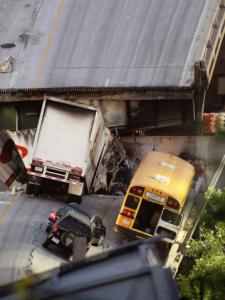|
Latest news:
More coverage:
|
For children, counselors on bus, shock mingles with relief
 |
The bus that was on the Interstate 35 west bridge when it fell was transporting 61 children and caregivers. (Scott Olson/Getty Images) |
MINNEAPOLIS -- By the time they reached the Interstate 35 west bridge over the Mississippi River, the children on the bus were water-tired and serene, some still in their bathing suits, ready to go home. It was a rare moment of quiet, and as the bus crossed over the Mississippi, a few of the community center counselors, barely out of adolescence themselves, had dozed off in their seats.
What happened then is difficult to describe, even a day later. Angi Haney, a counselor, realized first that she was not in her seat, and then that she was not touching any part of the bus, and then that "we were all just flying in the air." T.J. Mattson, 12, looked out a window and saw water on the other side. Dust filled the bus, blotting out its passengers.
And then they came to rest. Jeremy Hernandez, the 20-year-old who works as the summer program's gym coordinator, remembers time congealing. Then something broke the spell, his heart began pounding, and he jumped over two rows of seats and kicked open the back door. He remembers coolers flying; he remembers passing children forward to strangers lined up like a bucket brigade.
"I just acted," Hernandez said yesterday. "I just moved. My feet were just moving. My body was following."
The people who gathered at the Waite House, the neighborhood center that sponsored the bus trip, were shocked, but their shock was mixed with joy. Of the 61 children and caregivers who plunged 30 feet in the school bus, only 14 required hospitalization, and 10 of those were released quickly. None died. Instead, they returned to the center a day later -- some with cuts and bruises, some unmarked -- and swept one another up in hugs.
"It's one of those things," said Anthony Wagner, president of Pillsbury United Communities, which operates Waite House. "Five seconds, 10 seconds earlier, they would've been in the river. I think a miracle happened."
Waite House is a low-slung brick building in Phillips, a South Side Minneapolis neighborhood that for many years was home to Ojibways from the Red Lake and White Earth reservations. Since then, Latino immigrants and East African refugees have flowed into Phillips; photographs in Waite House's hallway show powwows and young girls in elaborate ceremonial dress.
Wooden houses with small yards line the streets, but children growing up in Phillips are hardly sheltered, said Kelly Morgan, 45, who has lived there for several years. Forty percent of them live below the poverty line, according to census figures. "You see everything you'd see on a New York street corner," said Morgan.
For the 60 children who attend Waite House's summer programs, a reward comes once a week: They pile into buses for a field trip like Wednesday's, to a water park. On the trip back, they were singing a song in Spanish about an elephant, said Monica Segura, 19, the center's summer coordinator. The children remarked on the river as they passed over it, she remembered, and then the bridge dropped from under them.
Segura grabbed two children in front of her, but others fell on top of one another and started screaming. The front of the bus was wedged against a guardrail, blocking its doors. The silence was broken, she said, by Hernandez, who "jumped over the seats and kicked out the door."
Hernandez sat beside her, looking self-conscious as she told the story. He had hoped to become an auto mechanic, he said, but dropped out of a training program around Christmas because he could no longer afford the tuition.
In the moments after the bus came to rest, the children "were all thinking they were going to die, and they wanted their parents," Hernandez said. He recalled that once while fishing in the Mississippi, he had plunged into the river to retrieve a pole, and the memory of the current rushed back to him in his seat on the bus. "I've been in that river," he said. "I don't want to go out that way."
Hernandez "woke everyone up," said 15-year-old Ivan Luna, who was sitting near him at the back of the bus. Kaliegh Swift, 10, nodded without a second's thought when asked whether Hernandez had saved her life. He was, she said, "the person who rounded everyone off the bus and helped everyone into the ambulance."
Hernandez recalled looking at the smoking semi-truck that was wedged in front of the bus and wondering how much time they had to evacuate. For what seemed like "forever," he said, he was "grabbing and pulling them down, grabbing and pulling." He barely slept Wednesday night, and his eyes were bloodshot. But he knew how he felt, he said. Lucky.
His mother lives on the north side of the Mississippi, he said, and he is forced to cross bridges frequently.
"I'm going to invest in a map," he said, "and try to go around them."